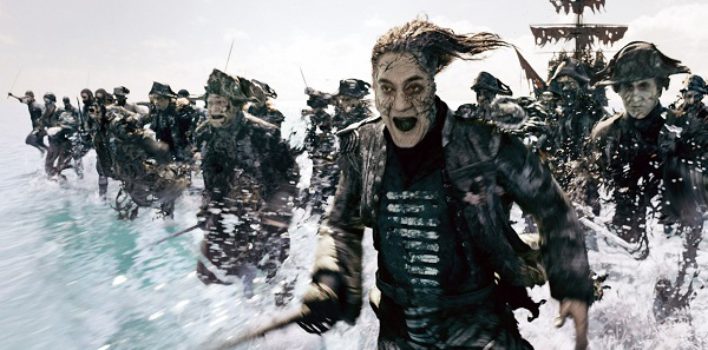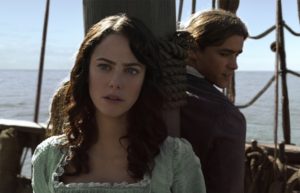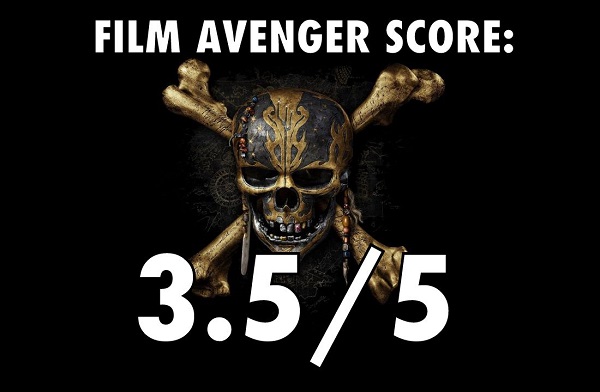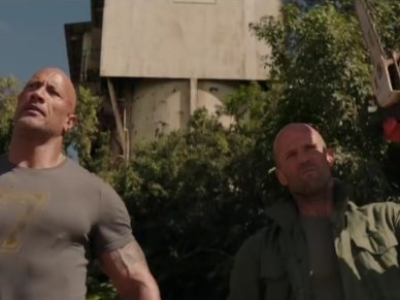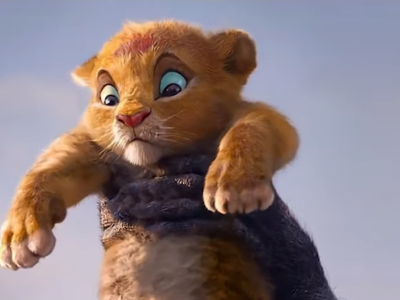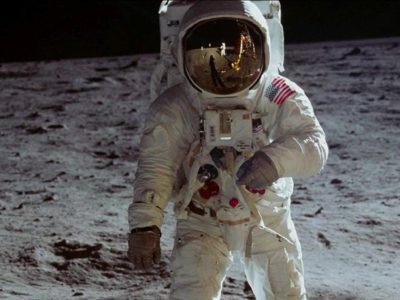Review| Pirates of the Caribbean: Dead Men Tell No Tales
 The Pirates of the Caribbean franchise is one of consternation to movie fans. It started off very promising in 2003, with one of the most unique films to come in a long time – totally reinventing and reviving a whole genre of movies that had been on the outs in the popular culture (ironic considering the source material was a theme park ride – not a usual source for strong content).
The Pirates of the Caribbean franchise is one of consternation to movie fans. It started off very promising in 2003, with one of the most unique films to come in a long time – totally reinventing and reviving a whole genre of movies that had been on the outs in the popular culture (ironic considering the source material was a theme park ride – not a usual source for strong content).
And then the sequels came.
If one is into the universe, one could overlook the problems in the relatively inferior sequels and just go along for the ride. They are fun in their own ways. Then there are others who cannot abide the lack of thought and quality some of the films have. I am in the former camp, with the Pirates sequels, for the most part, satisfying my taste for swashbuckling adventure.
Pirates of the Caribbean: Dead Men Tell No Tales, the fifth film in this franchise, is a passable Pirates sequel. I enjoyed it. It’s not the best Pirates film by any measure, but it’s not terrible. In the spectrum of the Pirates films, with Curse of the Black Pearl being best and At World’s End being worst, Dead Men Tell No Tales ranks number three on my list – right after Dead Man’s Chest.
Dead Men Tell No Tales has just enough of everything you love about the Pirates films to make it a pleasant experience: ship battles, supernatural elements, comic pirate hijinks, romance, familiar faces, and Jack Sparrow comedic moments. It also contains a longstanding thematic tradition of these films: the role of a father.
THAR BE SPOILERS AHEAD!
Stuff I Liked
Though some may believe he’s simply phoning it in (and there are several instances in the film where that might be true), I still enjoy Johnny Depp as Captain Jack Sparrow. He’s still got the spark of charisma and scoundrel after 15 years, even though both he and the character have gotten older.
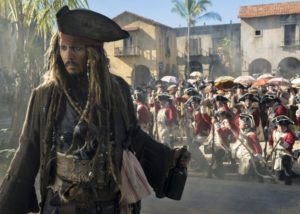 In fact, both Sparrow’s behavior and Depp’s subdued performance are somewhat warranted, given that (according to the film’s own timeline), 19 years have passed since the events of At World’s End, and five years since On Stranger Tides. Jack is in the midst of middle age and must be getting tired, disillusioned and bored with the pirate’s life. This is exactly how we found him in Dead Men Tell No Tales. He was a rock star at one time, but he’s acting more like a has-been.
In fact, both Sparrow’s behavior and Depp’s subdued performance are somewhat warranted, given that (according to the film’s own timeline), 19 years have passed since the events of At World’s End, and five years since On Stranger Tides. Jack is in the midst of middle age and must be getting tired, disillusioned and bored with the pirate’s life. This is exactly how we found him in Dead Men Tell No Tales. He was a rock star at one time, but he’s acting more like a has-been.
Captain Salazar and his crew are wonderfully realized ghosts. The makeup here deserves at least an Oscar nomination. They were scary, but not overly grotesque, just like Captain Barbossa’s skeleton pirates from the first film. I just wish there were more ghost-based gags to balance some of the darker moments.
I really liked the Trident of Poseidon as the film’s MacGuffin. Destroying it was a clever way to explain why there are virtually no curses anymore in today’s seafaring world (though there are still pirates), at least in the fantastical way they manifest in Pirates of the Caribbean. If this is the last film, it’s a good point upon which to end the series (though I don’t think this will be the last film, as displayed by the post-credits scene).
Another plot point I enjoyed was the revelation of just how Jack Sparrow collected all those incongruous pieces of junk he wears on his person. As shown in a flashback (the first in a Pirates film – still not sure how I feel about that), they were all pieces given to him in tribute by his first crew after he saved them from Salazar. This brought another layer of personality to Jack’s character – a sentimental layer that masks as eccentricity.
Stuff I Didn’t Like
I didn’t like Carina Smyth at all. She was a thinly-veiled modern feminist in a decidedly unmodern world, and she stuck out like a sore thumb. She was annoying and looked down upon everyone around her. There was nothing there but scorn. No spunk, no charisma. I’m all for strong female characters, but this is swinging the pendulum too far the other way.
Carina’s romantic relationship with Henry Turner was strained and forced. Not Episode II Anakin/Padme forced, but still pretty forced. There was very little chemistry between the two, and it seemed more like an “I’m annoyed with you,” until the end when it changed to “Well, I guess I like you for some reason.” It didn’t help that Henry was really half of a character that we had no time to get to know and sympathize with.
In fact, none of the character relationships were given ample time to grow. In the first film, for example, we followed Jack and Will on their journey and they had quiet moments to spend with each other, for Jack to teach Will lessons, and for Will to discover who he was. We get little of that here, and the only solid relationships are the ones we already know from previous films (like Jack and Gibbs).
The curse on Salazar and his crew was never explained with any solid reasoning and had little limitation. Going back the first film, we were shown and told why Barbossa and his crew were cursed, therefore extending the suspension of disbelief. The Pirates films have become lazier in this arena with each entry (in On Stranger Tides, Blackbeard can control his ship’s rigging with his magic sword and can shrink ships in bottles for some reason). There needs to be some kind of logic to the magic to make it believable.
Here’s another bit of frustrating illogic: why didn’t Will Turner come and save his son and Jack from Salazar with the crew of the Flying Dutchman? Will was supposedly a supernatural being of the sea after taking the mantle from Davy Jones. And it would have made for quite an epic battle. Undead versus undead? That would have been spectacular! Maybe they only had Orlando Bloom for a couple of days?
It was a little annoying that the characters who had been part of the series (Jack Sparrow, Will Turner, Elizabeth Swann, Barbossa, Gibbs) hadn’t aged very much. As stated before, this film takes place almost two decades after At World’s End, and I would think that there would at least be some weathering on their faces. I can understand if Will didn’t age though since he was an immortal being.
Stuff to Ponder
For being a series of supposedly mindless action/adventure films, the Pirates of the Caribbean series has a lot of offer thematically under its swashbuckling exterior. Especially in the first film, but embodied more or less in the succeeding films, is a spiritual side which is connected to familiar ideas of obtaining immortality and the requirement of blood sacrifice for sins committed.
But the most consistent thematic idea that extends throughout the entire series is about fathers and their relationships with their children.
Throughout the Pirates films, fathers are connected with personal identity. Will Turner struggled with his father’s legacy as a pirate. Elizabeth Swann had to choose between the man she loves and her father’s wishes. In Dead Men Tell No Tales, Carina was searching for clues left by her father to find out who she really was. Even Jack Sparrow sought the advice of his father, Captain Teague.
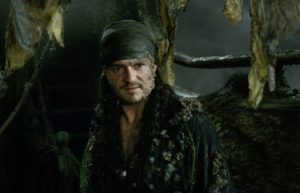 The protagonist pirates in these films are charming rogues with varying degrees of unscrupulous character – engaged in all sorts of sin and vice. But when they are confronted by their children, something within them turns them to do the right thing by their children and against their selfish nature. Bootstrap Bill Turner attempted to take on the lashes intended for his son and prevented Will from enduring a lifetime of servitude aboard the Flying Dutchman. Barbossa, learning that Carina was his daughter, sacrificed himself to save her.
The protagonist pirates in these films are charming rogues with varying degrees of unscrupulous character – engaged in all sorts of sin and vice. But when they are confronted by their children, something within them turns them to do the right thing by their children and against their selfish nature. Bootstrap Bill Turner attempted to take on the lashes intended for his son and prevented Will from enduring a lifetime of servitude aboard the Flying Dutchman. Barbossa, learning that Carina was his daughter, sacrificed himself to save her.
Culture today continuously marginalizes fathers as not being necessary to the rearing of their children. Fathers are often portrayed as bumblers or fools in many television shows and movies. Yet in the Pirates franchise, a film series at the center of popular culture, the power and importance of the father’s role is clearly portrayed. Also note that one would be hard-pressed to find main characters who are mothers in the Pirates films (aside from Elizabeth Swann, who eventually became a mother).
That is really what makes Will’s inability to come to Henry’s aid in Dead Men Tell No Tales so odd and inconsistent in the greater context of the series.
“Fathers, do not exasperate your children; instead, bring them up in the training and instruction of the Lord.” Ephesians 6:4
The role of mothers and fathers in the rearing of children are different and equally important. Fathers are there to establish protection for, and discipline in, their children. They teach their sons how to be men and serve as an example of manhood for their daughters. In the Christian tradition, they are also spiritual leaders, bringing their children up in the Word.
While our earthly fathers may have failed us at some point in our lives, we all have a Father in heaven who is the ideal father to all. He created us. He sustains us. And He sacrificed for us like many parents do for their own children so we can have a better life. This is a universal thing that we all known to be true, which is evidenced by its importance in pop culture fare like Pirates. There is something in a father/child relationship that is powerful and worthwhile.
God, the Father to all of us, also sacrificed Himself for us. He took on our sins so that we may inherit eternal life, despite our sins against Him.
So What I’m Trying to Say is
If you’re a fan of the Pirates of the Caribbean series, Dead Men Tell No Tales is worth watching. Those who have been ambivalent about the films since the first may not see anything new here to change their minds. It’s entertaining and full of the signature Pirates fun, but it also has a lot of frustrating qualities that prevented me from enjoying it further.
The Pirates films have a lot to say about the role of fathers, and Dead Men Tell No Tales is no exception. As conveyed in the films, fathers are an important component to a child’s upbringing. Fathers help guide their children in many aspects of life, most importantly bringing them up spiritually.
And for the people in the world who did not have an earthly father there to help them, they can look to God as their Father – a Father who will never leave them or forsake them, who will sacrifice for them unto death on a cross.


